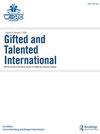Students’ perceptions of real engagement in active problem solving
Q3 Social Sciences
引用次数: 14
Abstract
ABSTRACT The purpose of this study was to explore 42 elementary students’ perceptions of their experiences while they were engaging in a class in which the Real Engagement in Active Problem Solving (REAPS) model was used. A qualitative study was conducted to analyze their responses. Individual interviews and artifacts were collected and analyzed. Themes were identified in students’ perceptions across interview questions: topic, process, activity, collaboration, support, intrapersonal skills, and emotions. Researchers recommend integrating REAPS in different contexts and collecting adequate background information as a way to understand the effectiveness of REAPS. Differentiation principles applied in REAPS were beneficial to students’ engagement, thereby helping them to achieve long-lasting learning.学生对积极解决问题的真正参与的认知
摘要本研究的目的是探讨42名小学生在积极解决问题的真实参与(REAPS)模型课堂上的体验感知。进行了一项定性研究来分析他们的反应。收集和分析了个人访谈和人工制品。在学生对面试问题的看法中确定了主题:主题、过程、活动、协作、支持、人际交往技能和情感。研究人员建议将REAPS整合到不同的环境中,并收集足够的背景信息,作为了解REAPS有效性的一种方法。在REAPS中应用的差异化原则有利于学生的参与,从而帮助他们实现持久的学习。
本文章由计算机程序翻译,如有差异,请以英文原文为准。
求助全文
约1分钟内获得全文
求助全文

 求助内容:
求助内容: 应助结果提醒方式:
应助结果提醒方式:


